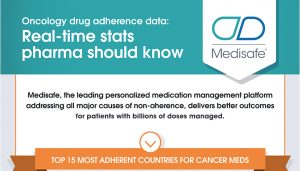Mediscoveries
Medisafe data shows that more than 25% of patients who take a leading asthma medication do so in the morning. Guidelines from the National Asthma Education and Prevention Program (NAEPP) state that this medication should only be taken at night for maximum efficacy. Medisafe analyzed real-time, de-identified and aggregate patient-reported data gathered from thousands of…
Read MoreHighlights from the Oncology Infographic The U.S. ranks amongst the lowest in reported oncology aherence as compared to other developed nations Unlike other therapeutic classes, patients on oncology meds are adherent every day of the week The highest reported oncology adherence rates on Medisafe are prior to breakfast and dinner hours Patients taking more oncology…
Read MoreThe rising cost of insulin is receiving more attention in the media and medical literature with the American Diabetes Association calling for solutions to insulin affordability. Medisafe data, however, indicate that cost may not be the highest concern for many insulin patients. It’s Not About Cost Medisafe analyzed whether cost impacts adherence rates among patients,…
Read MoreMedisafe’s real-world data shows patients treated for depression with a newer antidepressant brand (Brand-SSRI) are experiencing dramatically different perceived results in the first two months of therapy compared to patients on other SSRIs. Medisafe surveyed almost 2,000 patients and discovered that it takes Brand-SSRI patients six to eight weeks to experience therapeutic benefits from their…
Read MoreMedisafe’s real-world data shows that more than half of patients taking the most-prescribed antiplatelet meds have missed 1 to 5+ consecutive doses, leaving some untreated and at a greater risk of thrombosis and other complications. Overall adherence and reasons for skipping doses vary significantly by brand, complicating intervention efforts by healthcare companies lacking insight into…
Read More




